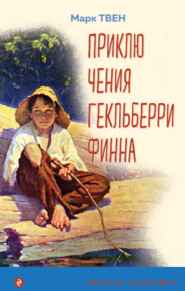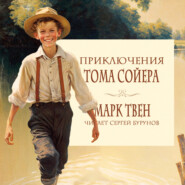По всем вопросам обращайтесь на: info@litportal.ru
(©) 2003-2024.
✖
Sketches New and Old
Настройки чтения
Размер шрифта
Высота строк
Поля
Примечания
1
Written about 1870.
2
Written about 1870.
3
Written about 1865.
4
Pronounced Cal-e-va-ras.
5
Being a letter written to a Poultry Society that had conferred a complimentary membership upon the author. Written about 1870.
6
Written about 1878.
7
Written about 1869.
8
Written about 1869.
9
Written about 1867.
10
Some years ago, about 1867, when this was first published, few people believed it, but considered it a mere extravaganza. In these latter days it seems hard to realize that there was ever a time when the robbing of our government was a novelty. The very man who showed me where to find the documents for this case was at that very time spending hundreds of thousands of dollars in Washington for a mail steamship concern, in the effort to procure a subsidy for the company – a fact which was a long time in coming to the surface, but leaked out at last and underwent Congressional investigation.
11
I have many such memories in my mind, but am thinking just at present of one particular one, where the Brannan Street butchers set their dogs on a Chinaman who was quietly passing with a basket of clothes on his head; and while the dogs mutilated his flesh, a butcher increased the hilarity of the occasion by knocking some of the Chinaman’s teeth down his throat with half a brick. This incident sticks in my memory with a more malevolent tenacity, perhaps, on account of the fact that I was in the employ of a San Francisco journal at the time, and was not allowed to publish it because it might offend some of the peculiar element that subscribed for the paper.
12
Written about 1867.
13
Written about 1867.
14
Written about 1867.
15
Written about 1870.
16
Written about 1865.
17
Written about 1868.
18
At least the above is the speech which I was going to make, but our minister, General Schenck, presided, and after the blessing, got up and made a great long inconceivably dull harangue, and wound up by saying that inasmuch as speech-making did not seem to exhilarate the guests much, all further oratory would be dispensed with during the evening, and we could just sit and talk privately to our elbow-neighbors and have a good sociable time. It is known that in consequence of that remark forty-four perfected speeches died in the womb. The depression, the gloom, the solemnity that reigned over the banquet from that time forth will be a lasting memory with many that were there. By that one thoughtless remark General Schenck lost forty-four of the best friends he had in England. More than one said that night, “And this is the sort of person that is sent to represent us in a great sister empire!”
19
In this paragraph the fortune-teller details the exact history of the Pike-Brown assassination case in New Hampshire, from the succoring and saving of the stranger Pike by the Browns, to the subsequent hanging and coffining of that treacherous miscreant. She adds nothing, invents nothing, exaggerates nothing (see any New England paper for November, 1869). This Pike-Brown case is selected merely as a type, to illustrate a custom that prevails, not in New Hampshire alone, but in every state in the Union – I mean the sentimental custom of visiting, petting, glorifying, and snuffling over murderers like this Pike, from the day they enter the jail under sentence of death until they swing from the gallows. The following extract from the Temple Bar (1866) reveals the fact that this custom is not confined to the United States. – “On December 31, 1841, a man named John Johnes, a shoemaker, murdered his sweetheart, Mary Hallam, the daughter of a respectable laborer, at Mansfield, in the county of Nottingham. He was executed on March 23, 1842. He was a man of unsteady habits, and gave way to violent fits of passion. The girl declined his addresses, and he said if he did not have her no one else should. After he had inflicted the first wound, which was not immediately fatal, she begged for her life, but seeing him resolved, asked for time to pray. He said that he would pray for both, and completed the crime. The wounds were inflicted by a shoemaker’s knife, and her throat was cut barbarously. After this he dropped on his knees some time, and prayed God to have mercy on two unfortunate lovers. He made no attempt to escape, and confessed the crime. After his imprisonment he behaved in a most decorous manner; he won upon the good opinion of the jail chaplain, and he was visited by the Bishop of Lincoln. It does not appear that he expressed any contrition for the crime, but seemed to pass away with triumphant certainty that he was going to rejoin his victim in heaven. He was visited by some pious and benevolent ladies of Nottingham, some of whom declared he was a child of God, if ever there was one. One of the ladies sent him a white camellia to wear at his execution.”
20
Written about 1870.
21
The reader is assured that if the cemeteries in his town are kept in good order, this Dream is not leveled at his town at all, but is leveled particularly and venomously at the next town.
22
Written about 1876.
23
Written about 1868.
24
Written about 1872.
25
1
Written about 1870.
2
Written about 1870.
3
Written about 1865.
4
Pronounced Cal-e-va-ras.
5
Being a letter written to a Poultry Society that had conferred a complimentary membership upon the author. Written about 1870.
6
Written about 1878.
7
Written about 1869.
8
Written about 1869.
9
Written about 1867.
10
Some years ago, about 1867, when this was first published, few people believed it, but considered it a mere extravaganza. In these latter days it seems hard to realize that there was ever a time when the robbing of our government was a novelty. The very man who showed me where to find the documents for this case was at that very time spending hundreds of thousands of dollars in Washington for a mail steamship concern, in the effort to procure a subsidy for the company – a fact which was a long time in coming to the surface, but leaked out at last and underwent Congressional investigation.
11
I have many such memories in my mind, but am thinking just at present of one particular one, where the Brannan Street butchers set their dogs on a Chinaman who was quietly passing with a basket of clothes on his head; and while the dogs mutilated his flesh, a butcher increased the hilarity of the occasion by knocking some of the Chinaman’s teeth down his throat with half a brick. This incident sticks in my memory with a more malevolent tenacity, perhaps, on account of the fact that I was in the employ of a San Francisco journal at the time, and was not allowed to publish it because it might offend some of the peculiar element that subscribed for the paper.
12
Written about 1867.
13
Written about 1867.
14
Written about 1867.
15
Written about 1870.
16
Written about 1865.
17
Written about 1868.
18
At least the above is the speech which I was going to make, but our minister, General Schenck, presided, and after the blessing, got up and made a great long inconceivably dull harangue, and wound up by saying that inasmuch as speech-making did not seem to exhilarate the guests much, all further oratory would be dispensed with during the evening, and we could just sit and talk privately to our elbow-neighbors and have a good sociable time. It is known that in consequence of that remark forty-four perfected speeches died in the womb. The depression, the gloom, the solemnity that reigned over the banquet from that time forth will be a lasting memory with many that were there. By that one thoughtless remark General Schenck lost forty-four of the best friends he had in England. More than one said that night, “And this is the sort of person that is sent to represent us in a great sister empire!”
19
In this paragraph the fortune-teller details the exact history of the Pike-Brown assassination case in New Hampshire, from the succoring and saving of the stranger Pike by the Browns, to the subsequent hanging and coffining of that treacherous miscreant. She adds nothing, invents nothing, exaggerates nothing (see any New England paper for November, 1869). This Pike-Brown case is selected merely as a type, to illustrate a custom that prevails, not in New Hampshire alone, but in every state in the Union – I mean the sentimental custom of visiting, petting, glorifying, and snuffling over murderers like this Pike, from the day they enter the jail under sentence of death until they swing from the gallows. The following extract from the Temple Bar (1866) reveals the fact that this custom is not confined to the United States. – “On December 31, 1841, a man named John Johnes, a shoemaker, murdered his sweetheart, Mary Hallam, the daughter of a respectable laborer, at Mansfield, in the county of Nottingham. He was executed on March 23, 1842. He was a man of unsteady habits, and gave way to violent fits of passion. The girl declined his addresses, and he said if he did not have her no one else should. After he had inflicted the first wound, which was not immediately fatal, she begged for her life, but seeing him resolved, asked for time to pray. He said that he would pray for both, and completed the crime. The wounds were inflicted by a shoemaker’s knife, and her throat was cut barbarously. After this he dropped on his knees some time, and prayed God to have mercy on two unfortunate lovers. He made no attempt to escape, and confessed the crime. After his imprisonment he behaved in a most decorous manner; he won upon the good opinion of the jail chaplain, and he was visited by the Bishop of Lincoln. It does not appear that he expressed any contrition for the crime, but seemed to pass away with triumphant certainty that he was going to rejoin his victim in heaven. He was visited by some pious and benevolent ladies of Nottingham, some of whom declared he was a child of God, if ever there was one. One of the ladies sent him a white camellia to wear at his execution.”
20
Written about 1870.
21
The reader is assured that if the cemeteries in his town are kept in good order, this Dream is not leveled at his town at all, but is leveled particularly and venomously at the next town.
22
Written about 1876.
23
Written about 1868.
24
Written about 1872.
25

















